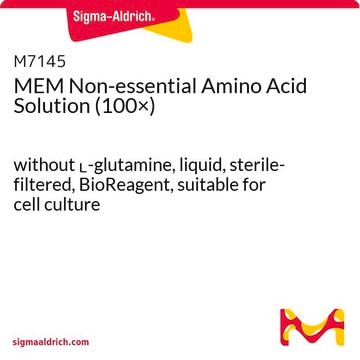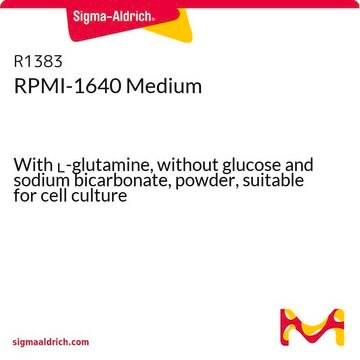R7513
RPMI-1640-Medium
With sodium bicarbonate, without methionine, cystine and ʟ-glutamine, liquid, sterile-filtered, suitable for cell culture
Synonym(e):
RPMI culture medium, RPMI-1640 cell culture medium, Roswell Park Memorial Institute 1640 medium
About This Item
Empfohlene Produkte
product name
RPMI-1640-Medium, Modified, with sodium bicarbonate, without methionine, cystine and L-glutamine, liquid, sterile-filtered, suitable for cell culture
Qualitätsniveau
Sterilität
sterile-filtered
Form
liquid
Methode(n)
cell culture | mammalian: suitable
Verunreinigungen
endotoxin, tested
Komponenten
HEPES: no
sodium pyruvate: no
phenol red: yes
L-glutamine: no
NaHCO3: yes
Versandbedingung
ambient
Lagertemp.
2-8°C
Suchen Sie nach ähnlichen Produkten? Aufrufen Leitfaden zum Produktvergleich
Allgemeine Beschreibung
Ergänzung
auch häufig zusammen mit diesem Produkt gekauft
Lagerklassenschlüssel
12 - Non Combustible Liquids
WGK
WGK 1
Flammpunkt (°F)
Not applicable
Flammpunkt (°C)
Not applicable
Analysenzertifikate (COA)
Suchen Sie nach Analysenzertifikate (COA), indem Sie die Lot-/Chargennummer des Produkts eingeben. Lot- und Chargennummern sind auf dem Produktetikett hinter den Wörtern ‘Lot’ oder ‘Batch’ (Lot oder Charge) zu finden.
Besitzen Sie dieses Produkt bereits?
In der Dokumentenbibliothek finden Sie die Dokumentation zu den Produkten, die Sie kürzlich erworben haben.
Kunden haben sich ebenfalls angesehen
Unser Team von Wissenschaftlern verfügt über Erfahrung in allen Forschungsbereichen einschließlich Life Science, Materialwissenschaften, chemischer Synthese, Chromatographie, Analytik und vielen mehr..
Setzen Sie sich mit dem technischen Dienst in Verbindung.









